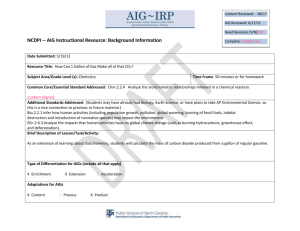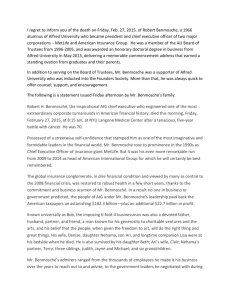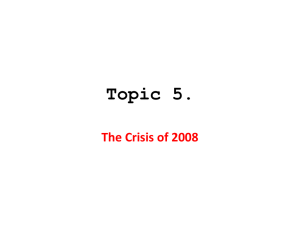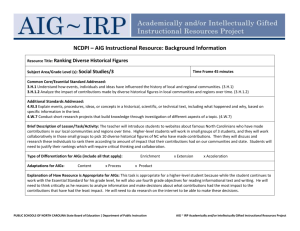AIG POLICIES
advertisement
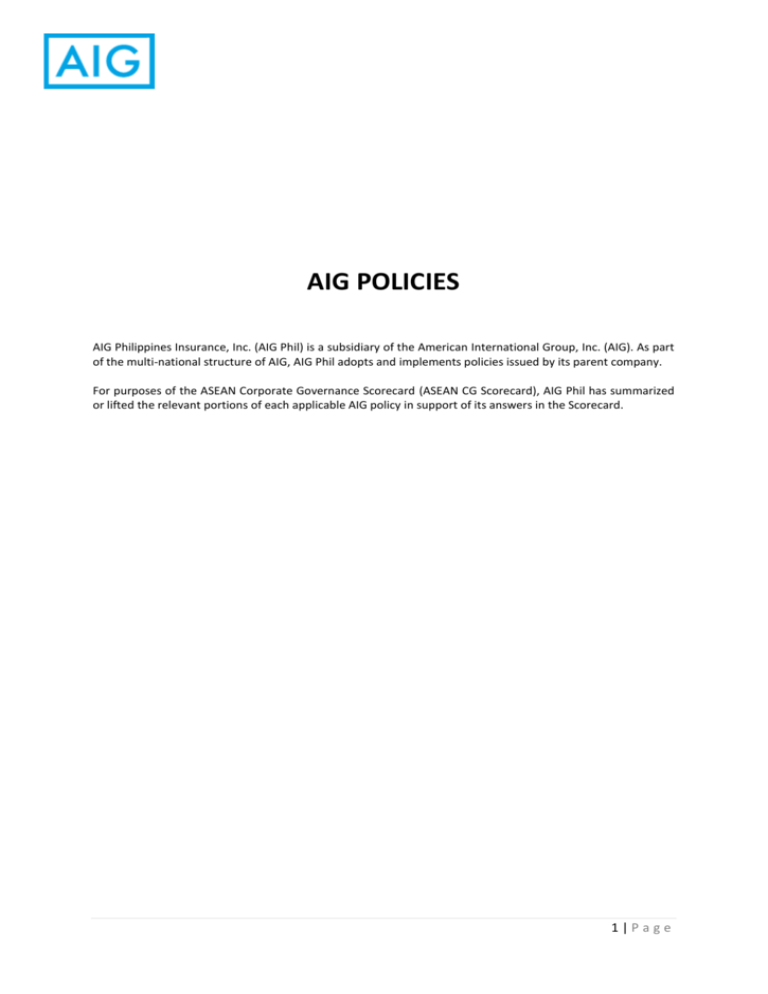
AIG POLICIES AIG Philippines Insurance, Inc. (AIG Phil) is a subsidiary of the American International Group, Inc. (AIG). As part of the multi-national structure of AIG, AIG Phil adopts and implements policies issued by its parent company. For purposes of the ASEAN Corporate Governance Scorecard (ASEAN CG Scorecard), AIG Phil has summarized or lifted the relevant portions of each applicable AIG policy in support of its answers in the Scorecard. 1|Page TABLE OF CONTENTS AIG Code of Conduct 3 AIG Director, Executive Officer and Senior Financial Officer Code of Business Conduct and Ethics 4 AIG Corporate Governance Policy 5 AIG Related-Party Transactions Approval Policy 6 AIG Global Anti-Corruption Policy 7 AIG Complaints Handling Policy 8 AIG Vendor Risk Management and Governance Policy 9 AIG Debt Administration Policy 10 2|Page AIG CODE OF CONDUCT Sustainability (In response to Items C.1.3, C.1.9 and C.1.13 of the ASEAN CG Scorecard) Through sustainable practices, each of us, as AIG employees, can do our part to help AIG make a positive contribution to society and the environment. Our environmental insurance operations lead the way in providing solutions that promote a cleaner and safer environment. Our insurance businesses have a long history of helping our customers recover from natural disasters. Over the years, the AIG companies have invested in developing “green funds” that invest in projects and technology that benefit the environment. Charitable Contributions (In response to Items C.1.4 and C.1.10 of the ASEAN CG Scorecard) AIG has a longstanding commitment to community involvement and charitable contributions. AIG companies give back to the communities they serve by organizing and supporting volunteer activities and outreach programs which provides a wide range of assistance to victims of natural and man-made disasters and emergencies around the world. AIG also provides its employees with a volunteer time off to support activities that enhance and serve communities. Safe, Healthy and Secure Workplace (In response to Items C.1.7, C.3.1 and C.3.2 of the ASEAN CG Scorecard) AIG is committed to conducting business in a manner that protects the health, safety and security of employees and customers while they are on AIG premises. Avoiding security breaches, threats, losses and theft requires that all employees remain vigilant in the workplace and while carrying out AIG business. Situations that may pose a health, safety, security or environmental hazard must be reported promptly to AIG management including issues that may impact AIG’s security, emergency readiness, or fire and life safety preparedness. Asking Questions and Raising Concerns (In response to Item C.4.1 of the ASEAN CG Scorecard) Most concerns likely to be faced at work can be resolved by talking to and working with management, human resources or the business unit compliance officer. In addition, employees may ask questions, raise concerns or report instances of non-compliance with this Code, AIG policies, or applicable laws and regulations by contacting AIG compliance helpline. Non-Retaliation Policy (In response to Items C.4.2 and D.2.6 of the ASEAN CG Scorecard) AIG prohibits retaliation against any employee for making a good faith report of actual or suspected violations of this Code, other AIG Policy, or applicable laws or regulations, and violation of this policy may be grounds for disciplinary action. Global Diversity and Opportunity (In response to Item E.4.6 of the ASEAN CG Scorecard) AIG seeks to hire and promote the best talent by providing a dynamic environment that brings people with diverse skills and ideas together. An inclusive, diverse workforce fosters innovation and enhances our position as a global market leader. This global diversity and opportunity policy equally applies to members of the board of directors of each AIG entity. 3|Page AIG DIRECTOR, EXECUTIVE OFFICER AND SENIOR FINANCIAL OFFICER CODE OF BUSINESS CONDUCT AND ETHICS Compliance with Laws, Rules and Regulations (In response to Item E.2.2 of the ASEAN CG Scorecard) It is the personal responsibility of each director, executive officer, and senior financial officer to adhere to the standards and restrictions imposed by those laws, rules, and regulations. Compliance with this Code and Reporting (In response to Items E.2.1, E.2.2. and E.2.3 of the ASEAN CG Scorecard) Any director, executive officer, or senior financial officer who becomes aware of any existing or potential violation of this Code shall promptly notify AIG’s appropriate counsel. AIG’s counsel will determine whether the transaction or relationship is in violation of this Code or the law. If any provision of this Code is not permitted by the local laws of a country in which AIG engages in business, then AIG’s counsel must be consulted and will determine whether there is a conflict and whether a waiver of this Code is necessary. AIG will not tolerate retaliation for reports of violations of this Code made in good faith. 4|Page AIG CORPORATE GOVERNANCE POLICY (In response to Item E.1.1 and E.1.3 of the ASEAN CG Scorecard) Board of Directors Composition – must reflect the range of skills, knowledge and experience necessary for such Boards of Directors to be effective. (In response to Item E.4.6 of the ASEAN CG Scorecard) Independent Directors - The following requirements apply to Independent Directors: (In response to Item E.2.7 of the ASEAN CG Scorecard) 1) Board of Directors must not have Independent Directors, except where: (a) Independent Directors are mandated by local law; or (b) An exception is obtained from the AIG General Counsel. 2) The appointment of any Independent Director must be reviewed and approved in advance in accordance with the Independent Director Screening and Approval Procedure. (In response to Items E.3.9 and E.3.10 of the ASEAN CG Scorecard) Training – must be offered to directors at least once per year and directors must make reasonable efforts to attend at least one training course per year and which may be, from time to time, supplemented with additional appropriate training. (In response to Items D.2.8, E.5.1 and E.5.2 of the ASEAN CG Scorecard) 1) Applicable Counsel must provide or make available the following materials to all newly appointed directors of AIG PC Companies: (In response to Item E.5.1 of the ASEAN CG Scorecard) (a) corporate organizational documents for the applicable AIG PC Company (e.g., articles of incorporation and by-laws); (b) general guidance on fiduciary duties of directors in the respective jurisdiction (In response to Item E.1.3 of the ASEAN CG Scorecard); and (c) the AIG Director, Executive Officer and Senior Financial Officer Code of Business Conduct and Ethics. 2) Applicable Counsel must provide or make available the following additional materials to all newly appointed Independent Directors of AIG PC Companies: (In response to Item E.5.1 of the ASEAN CG Scorecard) (a) the AIG Insider Trading Policy; and (b) the AIG Code of Conduct. 5|Page AIG RELATED-PARTY TRANSACTIONS APPROVAL POLICY Review and Approval of Related-Party Transactions (In response to Items B.5.2 and D.3.1 of the ASEAN CG Scorecard) All Related-Party Transactions are prohibited, unless approved or ratified by the appropriate corporate governance committee (the “Committee”) in accordance with this Policy. At each of its meetings, the Committee will be provided with the details of each existing or proposed Related-Party Transaction. In determining whether to approve a Related-Party Transaction, the Committee will consider the following factors, among others, to the extent relevant to the Related-Party Transaction: whether the terms of the Related-Party Transaction are fair to AIG and on terms at least as favorable as would apply if the other party was not or did not have an affiliation with a director, executive officer or employee of AIG; whether there are demonstrable business reasons for AIG to enter into the Related-Party Transaction; whether the Related-Party Transaction would impair the independence of a director; and whether the Related-Party Transaction would present an improper conflict of interests for any director, executive officer or employee of AIG, taking into account the size of the transaction, the overall financial position of the director, executive officer or employee, the direct or indirect nature of the interest of the director, executive officer or employee in the transaction, the ongoing nature of any proposed relationship, and any other factors the Committee or the Chairman of the Committee deems relevant. 6|Page AIG GLOBAL ANTI-CORRUPTION POLICY (In response to Item C.1.5 of the ASEAN CG Scorecard) Prohibited Conduct (In response to Item C.1.11 of the ASEAN CG Scorecard) Employees and third parties acting on AIG’s behalf or at AIG’s direction are prohibited from directly or indirectly making or receiving a bribe or improper payment to or for the benefit of any government official or other person. Due Diligence (In response to Item C.1.11 of the ASEAN CG Scorecard) Prior to engaging or doing business with a Third Party or joint venture partner, the Compliance Officer shall work with the appropriate AIG function or department to conduct due diligence to verify that the third party or joint venture partner does not present heightened legal, regulatory, or reputational risk for AIG. Written Agreements (In response to Item C.1.11 of the ASEAN CG Scorecard) Certain agreements, including agreements to engage Third Parties that may interact with Governments or Government Officials on AIG’s behalf and all joint venture partnerships, shall contain anti-corruption terms and conditions. 7|Page AIG COMPLAINTS HANDLING POLICY Policy Summary (In response to Item C.1.1 of the ASEAN CG Scorecard) AIG is committed to establishing and maintaining Complaint handling controls that are designed to make sure that all Complaints are dealt with promptly, fairly and effectively. These controls set forth requirements that include: identification of Complaints so as to distinguish them from ordinary business transactions; prompt acknowledgement of Complaints; effective review of Complaints; communication of the resolution of Complaints; monitoring and reporting on Complaint handling processes to measure effectiveness; creation and maintenance of a central repository to facilitate the accurate collection, reporting and analysis of Complaint data; and complete and accurate retention of all Complaints and related documentation. 8|Page AIG VENDOR RISK MANAGEMENT AND GOVERNANCE POLICY (VRMGP) Minimum Requirements (In response to Items C.1.2 and C.1.8 of the ASEAN CG Scorecard) AIG’s VRMGP encompasses the following minimum requirements for ALL Vendors: Risk Assessments: Each Vendor must be appropriately assessed and risk rated to help control and manage the risks associated with each engagement. Due Diligence: Each Vendor must undergo screening / due diligence to determine the Vendor’s eligibility to provide goods / services to AIG. This includes: 1) economic sanctions screening; and 2) additional due diligence (e.g., confirmation of maintenance of current and relevant licensing and registrations as applicable, anti-money laundering, anti-corruption and anti-boycott) to ensure applicable legal, regulatory and AIG policies and requirements are identified and complied with. Vendor Contract Inventory: An inventory of each Vendor’s contact information and contracts must be maintained. In addition to the minimum requirements, AIG may require additional requirements in compliance with this Policy. 9|Page AIG DEBT ADMINISTRATION POLICY (In response to Item C.1.12) Purpose (In response to Item C.1.12 of the ASEAN CG Scorecard) AIG considers administration of third party debt to be a critical function to prevent paying obligations late and in extreme circumstances creating an event of default. The purpose of this Policy is to ensure the proper recording of all debt and to maintain appropriate controls on cash flows associated with debt obligations. Governance (In response to Item C.1.6 of the ASEAN CG Scorecard) The Company maintains a clear system of relationships and accountability, with respect to debt administration. The intent of this Policy is to set forth the individuals who have responsibilities under this Policy. Failure to comply with this policy may be grounds for disciplinary actions, up to and including termination. 10 | P a g e


